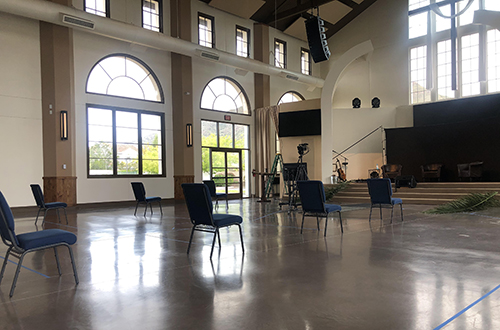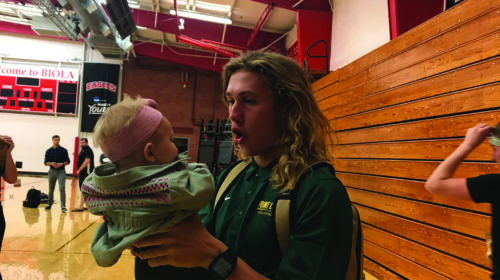
By Jim Clark
Last weekend was Palm Sunday, which for Christians around the world marks the beginning of Holy Week. Controversy erupted when Godspeak Calvary Chapel in Newbury Park, California provided communion to its members at their church despite the State of California “stay at home” order. This government order came with an extensive list of exceptions for individuals, services and industries engaged in activities deemed to be “essential” to public well-being. Despite following CDC guidelines for social distancing to prevent the spread of COVID-19, Godspeak was technically violating those orders since there is no exception for in-person services provided by faith-based organizations, and therefore are not considered by the state to be essential.

Rob McCoy, the lead pastor of Godspeak, member of the Thousand Oaks City Council and former mayor, felt so strongly about the issue that he resigned from the city council over it. Godspeak held its regular Sunday services as a livestream-only event with no physical attendees allowed, but McCoy felt that an in-person communion for church goers could be safely conducted after the service by adhering to CDC standards and maintaining recommended social distancing guidelines. McCoy was quoted as saying, “Our sanctuary holds 400 seats, we had 10 seats in the sanctuary, no one was ever closer than six feet distance, no one touched, no one hugged, we disinfected every chair when someone got up after taking communion and leaving…I would challenge anyone in Ventura County that is an essential organization to have done it as well as we did it.”
These events raise the issue of whether or not churches provide an essential service by holding communal religious rites, a question made all the more timely by the fact that it is during this week that Christians observe what they believe to be the most crucial events in the story of their faith, that of Jesus’s introduction of Communion, followed by his death and resurrection. According to the biblical account, during the Last Supper Jesus sat with his disciples, blessed the bread and wine, and asked them to eat and drink it as a remembrance of his body and blood which were broken and shed so that all who believe in Him would be saved from their sins and restored to God. Virtually all Christian denominations practice some form of communion, which is also called by other names, including Eucharist, Sacrament, and the Lord’s Supper. Many Christians consider it to be an essential part of their faith since they believe it was instituted and commanded by Jesus himself.
Is it essential enough to warrant an exception to lock-down rules during a viral pandemic? McCoy thought so. “For us to be paralyzed and be considered non-essential, though we would have liquor stores considered essential, cannabis distribution considered essential, abortions are considered essential,” McCoy said in a recorded video statement. “Is the church going to sit back and say that we’ll be relegated to the non-essential? The First Amendment declares that Congress shall make no law prohibiting the free exercise of religion. This is critical to us. We are essential, essential for the simple fact that God called us to this.” The full video of McCoy’s explanation of the situation can be seen below at https://youtu.be/uEmO9Bp6tXE.
Most Americans are reluctantly okay with Constitutional rights being temporarily suspended during an emergency. Freedom of assembly and freedom of religion are considered by many to be absolutely fundamental to the First Amendment, and thus cannot be cast aside casually without creating angst in the population. Michael Dorf, a law professor at Cornell, stated that a lock-down is effectively a suspension of habeas corpus (i.e. a suspension of personal liberty), which the Suspension Clause in Article One of the Constitution allows “when in Cases of Rebellion or Invasion the Public Safety may require it.” Thus, if the government defines COVID-19 as an invasion AND Congress votes to suspend habeas corpus until the emergency is over, this is all perfectly legal. They haven’t done that yet. If Congress believes that suspending Constitutional rights is appropriate in this situation – and it very well may be – then they should have the courage to do it the right way, by following Article One of the Constitution. It should be noted that so far there has been no federal lock-down order. This has been left to the individual state governors. But since only the U.S. Congress actually has the authority to suspend habeas corpus, it remains to be seen whether these statewide lock-downs are constitutional, even if they are shown to be prudent. Everything would be legally cleaner if Congress just stepped in and took clear federal legislative action. Then we wouldn’t have to have state-by-state arguments about what is essential and what is not, or about which activities and services are truly protected by the First Amendment.
It may be useful to consider which goods and services are officially considered essential during the COVID-19 lock-down in California. Beyond the obvious essential services, like hospitals, first responders and grocery stores, the list also includes liquor stores (that also sell food), hardware stores and home improvement centers, home appliance retailers, cannabis shops, laundromats and media services. The complete list of essential services is 14 pages long and can be found at https://covid19.ca.gov/img/EssentialCriticalInfrastructureWorkers.pdf. The question being asked by McCoy and others is essentially: why is it okay for people to line up six feet apart at a cannabis dispensary, but cannot line up six feet apart at a church for communion? Perhaps the main argument on the other side can best be summarized as, “This is an emergency situation so just do your religious services online. Communion isn’t truly essential in the short term.” The word “essential” turns out to be very subjective, heavily influenced by personal experience and perspective.
This controversy has exposed a difficult question for people of faith, as well as for the larger community: who gets to decide which practices of which religions are essential, and which are not?
Jim Clark is a resident of Ventura County.
All comments are solely the opinions of the author and not necessarily the position of the Conejo Guardian.
Follow us on Twitter @ConejoGuardian

